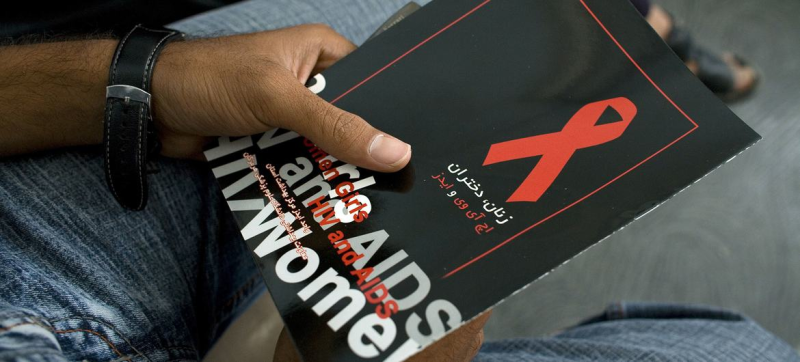- Eminent writer Badruddin Umar passes away |
- Dhaka’s air recorded ’moderate’ Sunday morning |
- Clashes in Hathazari over FB post; Section 144 imposed |
- Total Lunar Eclipse to Be Visible Sunday Night |
- 5 killed when bus plunged in Laxmipur canal |
WHO Calls for Immediate Rollout of HIV Prevention Jab

A man holds a brochure about HIV/AIDS as he waits to attend a meeting on the disease in Iran. (file)
A breakthrough HIV drug that only needs to be injected twice a year to offer near-total protection from the virus and developing AIDS should be made available “immediately” at pharmacies, clinics, and via online consultations, the UN health agency said on Monday.
Injectable lenacapavir—LEN, for short—is a highly effective, long-acting antiretroviral alternative to daily oral pills and other shorter-acting options, according to the World Health Organization (WHO).
“While an HIV vaccine remains elusive, lenacapavir is the next best thing: a long-acting antiretroviral shown in trials to prevent almost all HIV infections among those at risk,” said Tedros Adhanom Ghebreyesus, WHO Director-General.
WHO’s support for the injectable drug is significant because HIV prevention efforts are stagnating around the world.
To make it easier for people to receive the injection close to home, the UN agency also recommends the use of rapid testing kits for the disease, as opposed to “complex, costly procedures.”
According to the agency, 1.3 million people contracted HIV in 2024. The people most impacted were sex workers, men who have sex with men, transgender people, people who inject drugs, people in prisons, and children and teens.
“WHO is committed to working with countries and partners to ensure this innovation reaches communities as quickly and safely as possible,” insisted Tedros, speaking at the 13th International AIDS Society Conference (IAS 2025) on HIV Science in Kigali, Rwanda.
The recommendation for LEN is also in line with US health authorities, which approved it in June.
Although access to the LEN injection remains limited outside clinical trials today, WHO urged governments, donors, and partners to incorporate LEN “immediately” within national combination HIV-prevention programmes.
Other WHO-supported HIV-prevention options include daily oral tablets, injectable cabotegravir—which is injected once every two months—and the dapivirine vaginal ring, as part of a growing number of tools to end the HIV epidemic.
Amid massive funding cuts to the global effort to end HIV/AIDS—including the leading US government programme PEPFAR, launched in 2003 to combat the disease in Africa—WHO also issued new operational guidance on how to sustain priority HIV services.
“We have the tools and the knowledge to end AIDS… what we need now is bold implementation of these recommendations, grounded in equity and powered by communities,” said Dr Meg Doherty, Director of WHO’s Department of Global HIV, Hepatitis and STI Programmes and incoming Director of Science, Research, Evidence, and Quality for Health.
HIV remains a major global public health issue.By the end of 2024, an estimated 40.8 million people were living with HIV, with approximately 65 per cent in Africa. Around 630,000 people died from HIV-related causes globally, and an estimated 1.3 million people acquired HIV, including 120,000 children.
More positively, access to HIV drugs continues to expand, with 31.6 million people receiving treatment in 2024, up from 30.3 million a year earlier. Without antiretroviral medication, the HIV virus attacks the body’s immune system, ultimately leading to the onset of AIDS.

